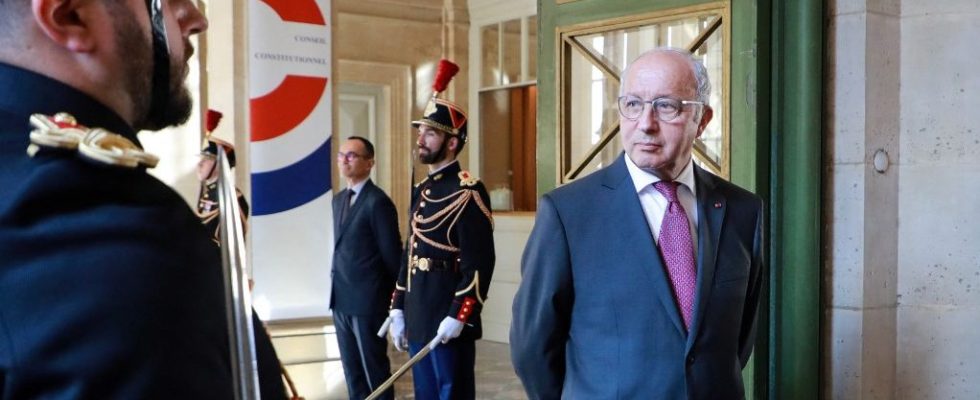Next institutional station for pension reform: the Constitutional Council. Two more titles. First for the referrals, almost traditional, of the oppositions on a text which they consider unconstitutional on several counts. But also for the shared initiative referendum (RIP) launched by Nupes. The proposal has gathered the signatures of 185 parliamentarians necessary to pass the first stage, it is now in the hands of the council of nine wise men chaired by former socialist Prime Minister Laurent Fabius. On the left, we bet – publicly in any case – a lot on these two actions.
On the referral, the rebellious warm up: “Look carefully at the Constitutional Council, we could have surprises”, whispered to journalists several times Éric Coquerel, the LFI president of the finance committee. “We made a fairly large referral,” we tell the rebellious group. Because there are several angles of attack: the legislative vehicle, a Social Security amending bill, while the project hardly weighs on the finances of 2023; the emergency procedure, which imposes an examination in fifty days and is questioned; the accumulation of “obstructs” in Parliament and the sincerity of the debates, from this emergency procedure to 49.3 through the blocked vote in the Senate, among others…
A controversial institution
The government took risks on the form with this pension reform, even the specialists of the Constitution agree: “All that, that is pleaded. On the clarity and sincerity of the debate, there is really an attractive idea, ”recognizes Thibaud Mulier, constitutional expert and teacher at Paris Nanterre. The “partial” censorship is almost already acquired: elements of this budgetary reform are not linked to the budget, they are “legislative riders”, and it is prohibited. The senior index, among others, should most certainly be revamped.
From here to imagine a total censorship, there is a world. “As I tell my students, ‘never expect anything from the Council of State or the Constitutional Council. And if something positive happens, it’s always good to take'”, smiles Thibaud Mulier. The Constitutional Council, created with the Fifth Republic in 1958, is indeed a controversial institution. “In general, that there is an institution ensuring the conformity of laws and treaties with the Constitution is a good thing”, assures the constitutionalist. Over time, the institution has also given itself power in matters of civil liberties.
“Suspicion”
The “original sin” of the Constitutional Council is its composition: nine members, chosen for nine non-renewable years, by the President of the Republic, the President of the Senate and the President of the Assembly. Even if there are some constraints on the appointment, “the three authorities have quite a lot of latitude. They pretty much do what they want,” comments Thibaud Mulier. Clearly: having recognized competence in constitutional matters is surprisingly not a condition sine qua non to be appointed to the Constitutional Council. Political figures at the end of their careers are increasingly present there, enough to fuel “suspicion” about the impartiality of the body.
“When the president appoints Jacqueline Gourault, who was his minister, there is a form of suspicion for ‘service rendered'”, notes the constitutionalist. In another genre, Thibaud Mulier wonders if an Alain Juppé, Prime Minister during the social movement of 1995, already partly on pensions, cannot have a certain “empathy, as a former politician who experienced the difficulties of the current government…”? Doubt sets in a little more when we look at the decisions taken in recent years: total censorship only concerned bills (coming from parliamentarians) and never bills (coming from the government). At LFI, we remember the censorship of the “global security” law, “a legally coarse text, ordered by Darmanin. It found itself largely in its law ” criminal responsibility and internal security ”, which, it, passed cream ”.
“A cannon pointed at Parliament”
Thibaud Mulier moderates: “If the law proposals of the deputies are of lower quality, it is because they are not written with the Council of State nor with all the ministerial bureaucracy. According to him, all the same, the Council remains “the watchdog of the executive”, according to the words of the “father” of the Fifth Republic, Michel Debré. Even “a cannon pointed at Parliament”, expression of the academic Charles Eisenmann. A socialist deputy, more positive, judges him that the Council “is not there to prevent the executive”.
In this game, we sometimes touch certain limits, with “really not rigorous” decisions, especially at the start of the health crisis. Two decisions caused a lot of talk in the legal world, including that of March 26, 2020. As a matter of urgency, at the start of the first confinement, the government passed an organic law to create a state of health emergency. Except that for such a law, it takes at least fifteen days between its presentation and its examination in Parliament, otherwise it is inconsistent. These fifteen days did not take place, but the Council let it pass, considering that it was necessary. “We understand the need in the context, but we cannot say that when we judge in law. There, the Council invokes necessity in the Machiavellian sense of the term, almost a ”reason of state”! “, laments Mulier.
Finally, let us return to the pension reform. In rebellious France, some want to believe that Laurent Fabius, who has two of his nine years left in office, will want to “come out on top, by censoring a law that flouted all previous case law”. Let’s face it: it would be a considerable surprise. Because with the exception of the legislative riders – almost painless –, on the rest of the text, and therefore the 64-year-olds, many specialists think that the Constitutional Council will not take the risk of invalidating the main campaign promise of the president , less than a year after his re-election.

